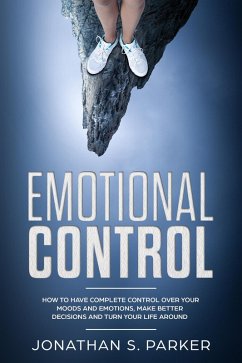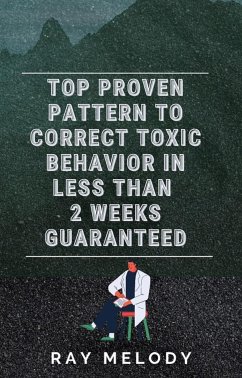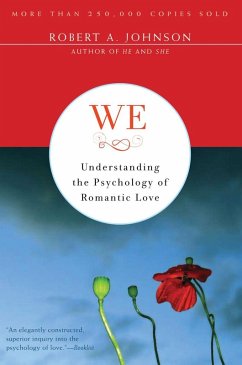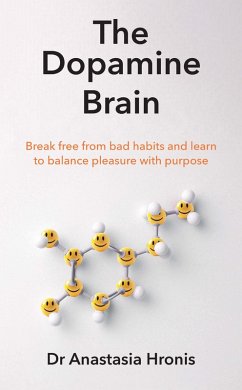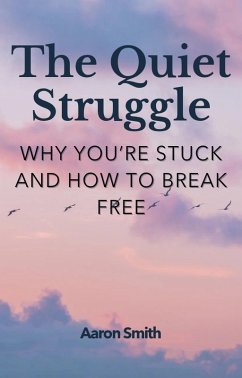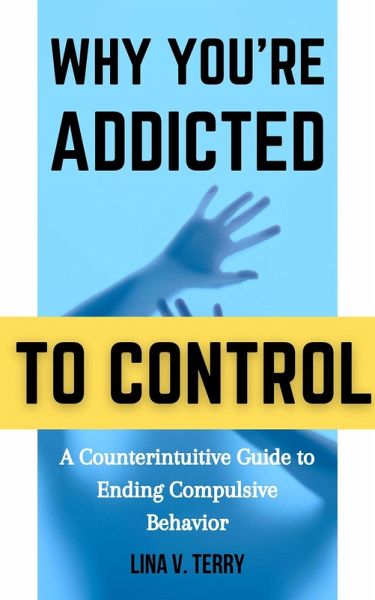
Why You're Addicted to Control: A Counterintuitive Guide to Ending Compulsive Behavior (eBook, ePUB)
Sofort per Download lieferbar
16,99 €
inkl. MwSt.

PAYBACK Punkte
0 °P sammeln!
Control feels like security. It creates the illusion of stability, making every decision, every plan, and every detail seem predictable. But the truth is, control doesn't prevent chaos-it creates it. The more a person tries to control, the more they become trapped by their own need for certainty. Instead of feeling in charge, they find themselves consumed by the exhausting effort of managing outcomes that were never truly in their hands. This book uncovers why control becomes an addiction and how it silently takes over decision-making, relationships, and peace of mind.The Patterns That Keep Co...
Control feels like security. It creates the illusion of stability, making every decision, every plan, and every detail seem predictable. But the truth is, control doesn't prevent chaos-it creates it. The more a person tries to control, the more they become trapped by their own need for certainty. Instead of feeling in charge, they find themselves consumed by the exhausting effort of managing outcomes that were never truly in their hands. This book uncovers why control becomes an addiction and how it silently takes over decision-making, relationships, and peace of mind.
The Patterns That Keep Control in Place
People rarely recognize control as an addiction because it disguises itself as responsibility, ambition, or even love. It manifests in perfectionism, micromanagement, and the inability to let go. When things feel uncertain, control provides a false sense of relief. But that relief is temporary. The cycle repeats-doubt creeps in, tension rises, and control takes over again. This book identifies the patterns that reinforce compulsive control and explains why breaking free requires more than just "letting go."
The Cost of Holding On Too Tight
Control comes at a price. It strains relationships, fuels anxiety, and narrows life to a rigid set of expectations. The need to control every situation can push people away, leaving behind frustration instead of connection. Internally, it turns into exhaustion-an endless loop of overthinking, second-guessing, and preparing for worst-case scenarios. This book breaks down the mental, emotional, and social toll of control addiction and why continuing down that path leads to burnout rather than fulfillment.
Why Control Doesn't Deliver Certainty
Despite the effort put into controlling outcomes, life remains unpredictable. Control doesn't eliminate uncertainty-it only makes it harder to deal with. When reality doesn't match expectations, the response is often more control: tighter schedules, stricter rules, and increased pressure. But this only amplifies stress. This book challenges the belief that control equals success and reveals why true stability comes from something entirely different.
The Hidden Fear Behind the Need for Control
At the core of control addiction is fear-the fear of failure, rejection, or the unknown. It isn't about being in charge; it's about avoiding discomfort. Control becomes a shield, a way to manage emotions without facing them. But suppressing fear doesn't eliminate it. Instead, it creates rigidity, leaving no room for growth or adaptability. This book explores how understanding the root fear behind control can lead to genuine freedom.
Learning to Trust the Uncontrollable
Breaking free from control addiction isn't about becoming passive-it's about developing trust. Trust in oneself, in others, and in the process of life. It requires shifting from force to influence, from rigidity to resilience. This book provides practical approaches for navigating uncertainty with confidence instead of control.
Reframing Success Without Control
The need for control is often linked to achievement. People believe that if they aren't constantly managing every detail, they will fail. But real success isn't about maintaining control-it's about learning how to respond when things don't go as planned.
Freedom from the Control Trap
Life is unpredictable, and no amount of control can change that. But learning how to break free from control addiction doesn't mean giving up-it means gaining back the energy wasted on trying to force certainty. By shifting focus from managing outcomes to managing responses, it's possible to experience clarity, confidence, and a sense of ease that control could never provide.
The Patterns That Keep Control in Place
People rarely recognize control as an addiction because it disguises itself as responsibility, ambition, or even love. It manifests in perfectionism, micromanagement, and the inability to let go. When things feel uncertain, control provides a false sense of relief. But that relief is temporary. The cycle repeats-doubt creeps in, tension rises, and control takes over again. This book identifies the patterns that reinforce compulsive control and explains why breaking free requires more than just "letting go."
The Cost of Holding On Too Tight
Control comes at a price. It strains relationships, fuels anxiety, and narrows life to a rigid set of expectations. The need to control every situation can push people away, leaving behind frustration instead of connection. Internally, it turns into exhaustion-an endless loop of overthinking, second-guessing, and preparing for worst-case scenarios. This book breaks down the mental, emotional, and social toll of control addiction and why continuing down that path leads to burnout rather than fulfillment.
Why Control Doesn't Deliver Certainty
Despite the effort put into controlling outcomes, life remains unpredictable. Control doesn't eliminate uncertainty-it only makes it harder to deal with. When reality doesn't match expectations, the response is often more control: tighter schedules, stricter rules, and increased pressure. But this only amplifies stress. This book challenges the belief that control equals success and reveals why true stability comes from something entirely different.
The Hidden Fear Behind the Need for Control
At the core of control addiction is fear-the fear of failure, rejection, or the unknown. It isn't about being in charge; it's about avoiding discomfort. Control becomes a shield, a way to manage emotions without facing them. But suppressing fear doesn't eliminate it. Instead, it creates rigidity, leaving no room for growth or adaptability. This book explores how understanding the root fear behind control can lead to genuine freedom.
Learning to Trust the Uncontrollable
Breaking free from control addiction isn't about becoming passive-it's about developing trust. Trust in oneself, in others, and in the process of life. It requires shifting from force to influence, from rigidity to resilience. This book provides practical approaches for navigating uncertainty with confidence instead of control.
Reframing Success Without Control
The need for control is often linked to achievement. People believe that if they aren't constantly managing every detail, they will fail. But real success isn't about maintaining control-it's about learning how to respond when things don't go as planned.
Freedom from the Control Trap
Life is unpredictable, and no amount of control can change that. But learning how to break free from control addiction doesn't mean giving up-it means gaining back the energy wasted on trying to force certainty. By shifting focus from managing outcomes to managing responses, it's possible to experience clarity, confidence, and a sense of ease that control could never provide.
Dieser Download kann aus rechtlichen Gründen nur mit Rechnungsadresse in A, B, CY, CZ, D, DK, EW, E, FIN, F, GR, H, IRL, I, LT, L, LR, M, NL, PL, P, R, S, SLO, SK ausgeliefert werden.





